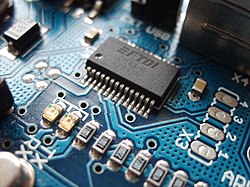Ìṣiṣẹ́oníná

Ìṣiṣẹ́oníná tabi Ẹ̀lẹ́ktrónìkì tabi Ẹ̀lẹ́ktrónìksì (Electronics) ni eka isiseeda, iseero ati oroiseona to unda lori awon asoyipo onitanna to ni awon active electrical component|ohuninu onitanna alagbese bi igo adipa, tiransisto, asinameji ati awon asoyipo olodidi, ati awon oroiseona onirele to je mo won. Iwuwa alaije-onigbooro awon ohuninu alagbese ati ilese won lati kojanu isan elektroni je ki isodigbangba amioloro alailagbara o seese be sini o je mimulo si aroye ati igbese amioloro. Bakanna, ilese awon ero-imulo onina lati sise bi switches je ki igbese aroye eleyoika o seese. Awon oroiseona isomorapapo bi awon patako asoyipo, oroiseona ikopo isiseonina, ati orisi iru awon ipile ibanisoro lo so imusise asoyipo di odidi, o si unje ki gbogbo awon ohuninu otooto yi o di sistemu asise.
Isiseonina yato si sayensi ati oroiseona onitanna and elero-onina, ti won unda lori imuwaye, ipinka, switching, ifipamo ati iyipada okun onitanna si ati lati awon iru okun miran nipa lilo waya, oko, generators, batiri, switches, relays, transformers, resistors and other passive components. This distinction started around 1906 with the invention by Lee De Forest of the triode, which made electrical amplification of weak radio signals and audio signals possible with a non-mechanical device. Until 1950 this field was called "radio technology" because its principal application was the design and theory of radio transmitters, receivers and vacuum tubes.
Today, most electronic devices use semiconductor components to perform electron control. The study of semiconductor devices and related technology is considered a branch of solid state physics, whereas the design and construction of electronic circuits to solve practical problems come under electronics engineering. This article focuses on engineering aspects of electronics.

|
Àyọkà yìí tàbí apá rẹ̀ únfẹ́ àtúnṣe sí. Ẹ le fẹ̀ jù báyìí lọ tàbí kí ẹ ṣàtúnṣe rẹ̀ lọ́nà tí yíò mu kúnrẹ́rẹ́. Ẹ ran Wikipedia lọ́wọ́ láti fẹ̀ẹ́ jù báyìí lọ. |
